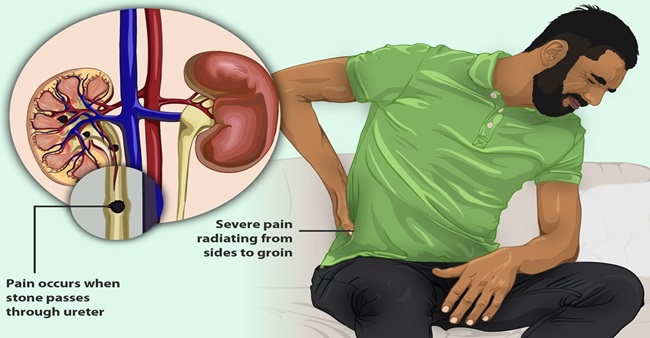
Kidney stones are tiny, hard salt and mineral deposits that form in our kidneys. They can cause pain, discomfort and, in few severe cases, lead to complications. Identifying the root causes and taking preventive measures can significantly lower the risk of formation of kidney stones. They can vary in their shape, size, and color.
The main types of kidney stones are calcium, uric acid, struvite, and cystine. Let us go through four different types of kidney stones in detail:
1. Calcium stones
Calcium stones are most common type of kidney stone. These stones are mainly caused by high levels of calcium in the urine. These also includes calcium phosphate stones and calcium oxalate stones.
2. Uric acid stones
Uric acid stones occur when urine contains high amount of uric acid. Major reasons for these stones are consuming high amount of animal protein, and not drinking enough water.
3. Struvite stones
These stones are common in women and occur after a urinary tract infection (UTI).
4. Cystine stones
These stones occur due to a genetic disorder called cystinuria.
Causes of Kidney Stones
Kidney stones usually develop when substances in the urine, including oxalate, calcium, and uric acid, become highly concentrated. This increased concentration can cause formation of crystals, which may gradually grow into stones. Various factors can contribute to the formation of kidney stones.
Let’s go through some of the factors that can cause kidney stones:

1. Dehydration: Not drinking enough water ultimately causes concentrated urine, increases the chance of developing stones.
2. Dietary Factors:
- If you consume high amount of sodium, it can increase calcium levels in urine.
- Eating high amount of oxalate-rich foods, such as nuts and spinach, may also cause stone formation.
- If you consume large quantities of animal protein, it can increase uric acid levels.
3. Medical Conditions: Few medical conditions like urinary tract infections, hyperparathyroidism, metabolic disorders, can also contribute to the formation of kidney stones.
4. Genetics: If you have a family history of kidney stones, it can increase the risk of developing a kidney stone.
5. Medications: Some kind of medications, such as calcium-based antacids and diuretics can contribute to the formation of stones.
Prevention of Kidney Stones
Preventing kidney stone formation includes changes in your lifestyle and dietary changes to reduce risk of formation. Here are few ways to prevent kidney stones from developing:
1. Stay Hydrated:
- Drink minimum 8-10 glasses of water every day to produce a clean urine and reduce stone forming substances.
- Include citrus juices that contains citrate and vitamin c in your diet. This can help in preventing stone formation.
2. Monitor Your Diet:
- Reduce sodium intake to prevent calcium deposit in urine.
- Also limit consuming oxalate-rich foods.
- Reduce calcium intake as well. Avoid high quantities of supplements, but you can consume dietary calcium such as yogurt, milk.
3. Reduce Animal Protein:
- Avoid animal-based protein and use plant-based protein sources such as tofu and legumes.
- Avoid using high amount of red meat and shellfish.
4. Maintain a Healthy Weight:
If you have an overweight issue, it increases the risk of kidney stone formation. Regular exercise and well-balanced diet can help you in maintaining a healthy weight.
5. Consult a Doctor:
If you have a kidney stone issue or a medical history of forming kidney stones, then always consult a good doctor. They may recommend special dietary plans or required medications to prevent recurrence.
Foods that may help you in preventing kidney stones include:
Fruits and vegetables: Fruits and vegetables are rich sources of citrate and contains high amounts of water. This can help in preventing stone formations.
Plant based proteins: Plant based proteins like lentils, beans, chickpeas, and peas can help you in reduce the risk of kidney stone formation.
Potassium rich foods: Foods like bananas can help in balancing oxalate as well as calcium levels in your body. Hence prevents kidney stone formation.
Calcium rich foods: Calcium-rich foods such as soy products, beans, seeds, dairy products, and some green vegetables can help you in kidney stone prevention.
You can also limit your intake of following foods to prevent kidney stones:
Animal protein: Reduce consuming animal proteins like chicken, eggs, fish, pork, and red meat. Animal protein can increase the risk of kidney stone formation in your body.
Caffeine: Limit your intake of drinks that contain caffeine such as coffee, and tea.
Oxalate rich foods: Avoid consuming high quantities of foods that are high in oxalates such as spinach, and leafy green vegetables. Because oxalate can bind calcium and other minerals and ultimately leads to the formation of kidney stones.
Kidney stones can negatively impact on your quality of life. By improving your lifestyle such as drinking sufficient quantities of water, observing your food intake, and seeking a good doctor’s advice may help you in reducing the chances of kidney stone formation.
Prevention is always better than cure. Improve your lifestyle and have a healthy life ahead!











